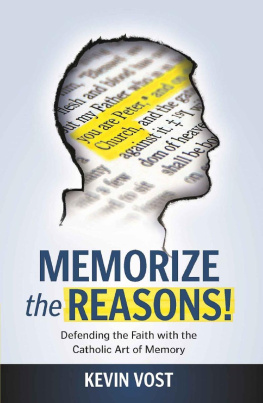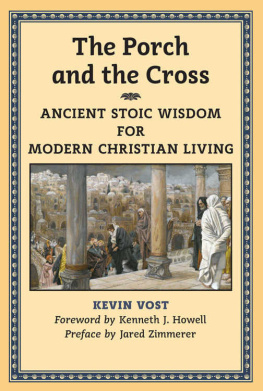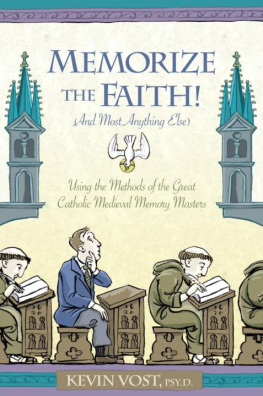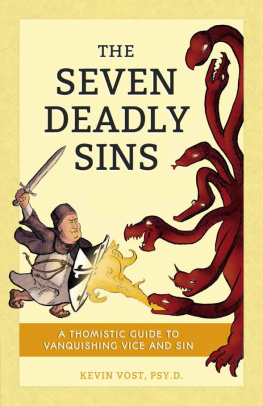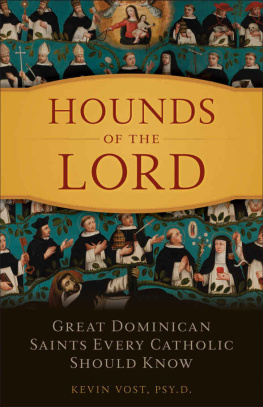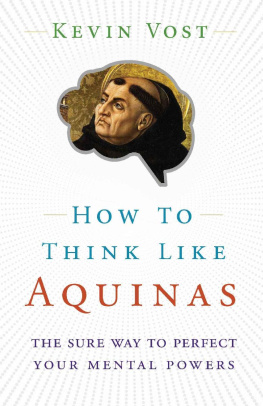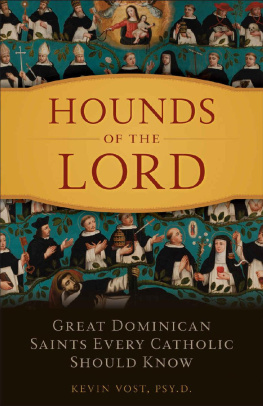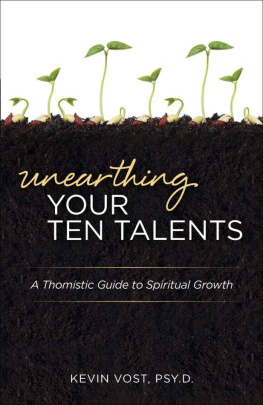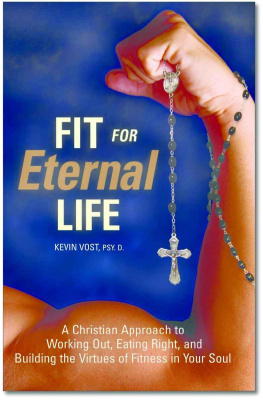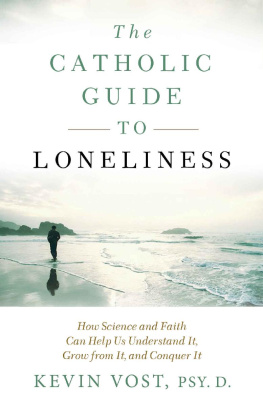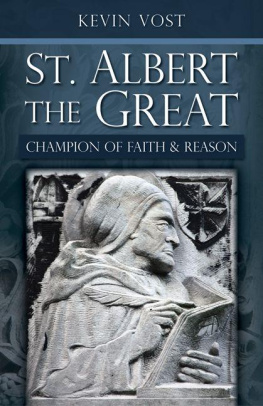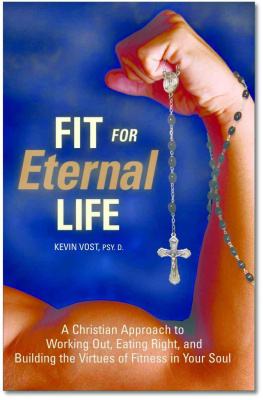Kevin Vost - Memorize the Reasons! Defending the Faith with the Catholic Art of Memory
Here you can read online Kevin Vost - Memorize the Reasons! Defending the Faith with the Catholic Art of Memory full text of the book (entire story) in english for free. Download pdf and epub, get meaning, cover and reviews about this ebook. year: 2013, publisher: Catholic Answers Press, genre: Religion. Description of the work, (preface) as well as reviews are available. Best literature library LitArk.com created for fans of good reading and offers a wide selection of genres:
Romance novel
Science fiction
Adventure
Detective
Science
History
Home and family
Prose
Art
Politics
Computer
Non-fiction
Religion
Business
Children
Humor
Choose a favorite category and find really read worthwhile books. Enjoy immersion in the world of imagination, feel the emotions of the characters or learn something new for yourself, make an fascinating discovery.
- Book:Memorize the Reasons! Defending the Faith with the Catholic Art of Memory
- Author:
- Publisher:Catholic Answers Press
- Genre:
- Year:2013
- Rating:5 / 5
- Favourites:Add to favourites
- Your mark:
- 100
- 1
- 2
- 3
- 4
- 5
Memorize the Reasons! Defending the Faith with the Catholic Art of Memory: summary, description and annotation
We offer to read an annotation, description, summary or preface (depends on what the author of the book "Memorize the Reasons! Defending the Faith with the Catholic Art of Memory" wrote himself). If you haven't found the necessary information about the book — write in the comments, we will try to find it.
Memorize the Reasons! Defending the Faith with the Catholic Art of Memory — read online for free the complete book (whole text) full work
Below is the text of the book, divided by pages. System saving the place of the last page read, allows you to conveniently read the book "Memorize the Reasons! Defending the Faith with the Catholic Art of Memory" online for free, without having to search again every time where you left off. Put a bookmark, and you can go to the page where you finished reading at any time.
Font size:
Interval:
Bookmark:

Memorize the Reasons!
Defending the Faith with the Catholic Art of Memory
K EVIN V OST
Memorize the Reasons!
Defending the Faith with the Catholic Art of Memory

San Diego
2013
Memorize the Reasons!
Defending the Faith with the Catholic Art of Memory
2013 by Kevin Vost
All rights reserved. Except for quotations, no part of this book may be reproduced or transmitted in any form or by any means, electronic or mechanical, including photocopying, recording, uploading to the Internet, or by any information storage and retrieval system, without written permission from the publisher.
Unless otherwise noted, biblical citations are taken from the Revised Standard Version of the Bible ( 1971 by Division of Christian Education of the National Council of the Churches of Christ in the United States of America).
Published by Catholic Answers, Inc.
2020 Gillespie Way
El Cajon, California 92020
1-888-291-8000 orders
619-387-0042 fax
catholic.com
Printed in the United States of America
978-1-938983-49-8 (print)
978-1-938983-50-4 (Kindle, electronic)
978-1-938983-51-1 (ePub, electronic)
To Kathy Ann Vost
Like the sun rising in the heights of the Lord, so is the beauty of a good wife in her well-ordered home.
Sirach 26:16
Acknowledgments
Without counsel plans go wrong, but with many advisers they succeed. To make an apt answer is a joy to a man, and a word in season, how good it is!
Proverbs 15:2223
Many thanks to Karl Keating for providing me the honor of writing for Catholic Answers for the first time, while working yet again (the sixth time, if I recall correctly) with my ever-patient, ever insightful editor, Todd Aglialoro, and with the man who so deftly puts the ink to the images of the Catholic art of memory, my many-time illustrator, Ted Schluenderfritz. Thanks also to Tim Staples for his apologetics insights, and to everyone at Catholic Answers who helped bring this book to print. Special thanks also go to the authors, bloggers, and friends who read chapters and provided much helpful feedback. (You know who you are, Peggy Bowes, Brett Feger, Shane Kapler, and Jared Zimmerer...) With wise counselors such as these, I alone remain accountable for any remaining infelicities between the front and back covers.
Foreword
I Should Have Said
Unbelievers are frequently impressed by the goodness and kindness of some Catholic who has come their wayimpressed to the point where they wonder if his excellence may be due to something in his religion. So they ask him to explain his religion to them. If he answers intelligently and winningly, then the result is all good, and the episode may end with the unbeliever receiving instruction from a priest. But if the Catholic talks nonsense, then the unbeliever can but depart, as sure as ever of that one Catholics goodness, but convinced that his religion has nothing to do with it.
Frank J. Sheed, Theology for Beginners
Indeed there is never a moment when we do not wish to commit something to memory, and we wish it most of all when our attention is held by a business of special importance. So, since a ready memory is a useful thing, you see clearly with what great pains we must strive to acquire so useful a faculty. Once you know its uses you will be able to appreciate this advice.
Marcus Tullius Cicero, Ad Herennium (For Herennius)
Have you ever been challenged about some doctrine of the Catholic faith, or met with a sincere inquiry from a non-Catholic Christian, and stood there slack-jawed? You had read or heard the answers before. They were there in the deep recesses of your long-term memory. Some may have made it to the tip of your tongue. But why didnt they then come out in articulate, organized speech? Why couldnt you remember the wordsthe reasons for the faith you hold when it counted?
It would be great, you might have thought, if there were some way to lock down that information in your mind, ready to be recalled and shared with others when the need arose. Wouldnt it be even better if this memory method were laid out in an illustrated step-by-step manual directly applied to apologetic arguments defending key Catholic doctrines? Better still if this memory method had been developed, enhanced, and passed on to us by some of the most profound Doctors of the Church?
Been There, Done That
Ive been there myself. Ive been asked about the reasons for particular Catholic beliefssometimes from people who bore ill will toward the Church, other times from those who asked out of benevolent curiosity. Theyve wanted to know things like where the pope or purgatory are found in the Bible, why Catholics worship Mary, and why we dont recognize the Bible as the inerrant word of God.
If I were to have drawn solely upon the fund of the formal Catholic education of my childhood and adolescence, my responses would have been something like the following: I dont think they are in the Bible, but we have our reasons; We dont really worship Mary, but we greatly respect her and pray to her; and We do believe in the Bible (though Im not sure if all the stories are literally true), and we also believe in the authority of the Church.
Since my return to the Church in 2004 and my subsequent immersion in study of Scripture, the Catechism , the Summa, and the works of so many wonderful ancient and modern Catholic apologists, I have been able to answer such questions at a deeper level, but I still could not lay out much of an organized response with specific reasons, and certainly couldnt cite chapter and verse from the Bible or the writings of the early Christians. Maybe later, checking some of my books, I could figure out what I should have said, but the moment of opportunity had long passed.
What kind of witness was I, then, to the Catholic faith that were all called to share?
From Memorize the Faith! to Memorize the Reasons!
To shorten a long story that I have told elsewhere, when I came back to the Church at age forty-three I sought to share something Id learned during my twenty-five years in the atheistic wilderness. While researching a masters thesis on memory strategy instruction with adolescents, I examined not only the modern psychological research on memory improvement techniques but the history of those methods. In so doing I learned that Sts. Albert the Great and Thomas Aquinas studied, adapted, improved, and applied an age-old art of memory improvement first developed in ancient Greece and Rome. It struck me that I had never seen these methods discussed in any Catholic books, let alone actually applied to help modern-day Catholics memorize key tenets of the faith. So, shortly thereafter, I did what I could to remedy the situation by writing Memorize the Faith!
In the book I offered a guided tutorial helping readers apply that ancient memory method to all sorts of basic catechetical material: the Ten Commandments, the virtues and deadly sins, the Beatitudes, sacraments, mysteries of the rosary, names of all the books in the Bible, and much more. My barber suggested adding apologetics applications, but I ran out of space, and so I just mentioned apologetics in passing as a possibility for future applications.
Well, the future is here! In this book we will focus on memorizing essential topics of Catholic apologetics, so that the next time your faith is questioned or challenged, you wont be left pondering what you should have said . Instead youll always stand ready to give good reasons for the hope that is within you (1 Pet. 3:15).
Next pageFont size:
Interval:
Bookmark:
Similar books «Memorize the Reasons! Defending the Faith with the Catholic Art of Memory»
Look at similar books to Memorize the Reasons! Defending the Faith with the Catholic Art of Memory. We have selected literature similar in name and meaning in the hope of providing readers with more options to find new, interesting, not yet read works.
Discussion, reviews of the book Memorize the Reasons! Defending the Faith with the Catholic Art of Memory and just readers' own opinions. Leave your comments, write what you think about the work, its meaning or the main characters. Specify what exactly you liked and what you didn't like, and why you think so.

